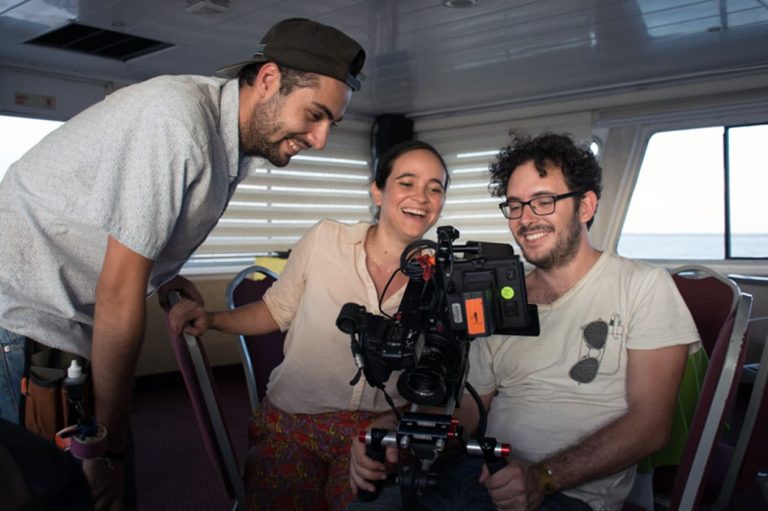18 de abril 2024

Children of Exile: The Births “Sowing Hope” in the Camp of Nicaraguan Farmers

PUBLICIDAD 1M
PUBLICIDAD 4D
PUBLICIDAD 5D
Nicaraguan filmmaker narrates in her upcoming film “Pantasma” how she was forced to leave the country, despite her parents being revolutionaries

Nicaraguan filmmaker Gloria Carrión during the filming of her movie “Heiress of the Wind”. Photo: Courtesy
Exile is the theme of the film Gloria Carrion is working on, a filmmaker who always draws from her own experience. In “Pantasma,” she recounts how she was forced to leave her country, Nicaragua, something unimaginable when she shot her first feature film based on the story of her parents, both Sandinista revolutionaries.
The events her country experienced in recent years turned her into “a critical voice on the Sandinistas that grew up with the Sandinistas,” as she defined herself on April 16, 2024, in an interview with EFE, just before participating in a colloquium at Casa de America in Madrid, Spain.
“Dialogue spaces like this one in Madrid, with different voices, are important, while we hope that in the future there will be genuine dialogue that allows Nicaragua to recover democracy,” said the filmmaker, who was forced to emigrate in 2021 and now lives in Italy.
Exile is “a tear that causes a deep wound because you not only leave a place, you also leave your childhood, your memories, the smell of the dish you like, and the color of the sunset.”
“You carry all that weight wherever you go,” but exile can also be a window of hope because, in her opinion, “the abrupt departure of so many people can have a transformative potential.”
Gloria Carrion insists that she is just one more in “the exodus of hundreds of people” who left Nicaragua after the protests of 2018, and although the Ortega regime “uses exile as a form of repression,” the filmmaker believes it can backfire.
In her next film Carrion deals with another theme that obsesses her, the concept of the enemy, because it was “a very strong shock” to realize that she, who was born into a militant family, where the Sandinistas were friends and the “contras” were enemies, suddenly became the enemy of her former friends.
“It is very interesting and painful to see how enemies are constructed and what is behind those constructions, which are never random and always have an objective,” she reflects.
This theme was already present in her first feature film, “Heiress of the Wind,” in which she narrated how her parents risked their lives for the revolutionary cause; how she lived a lonely childhood, and how later, over the years, she began to understand that she had to let go and seek reconciliation, not only with her parents but with their entire generation, including those who fought on the opposite side.
In the film, which is being screened this Tuesday at Casa de America, she interviews her parents, but also those who fought against her parents, and it ends with a glimmer of hope.
But after the release of this film in Nicaragua in 2018, the demonstrations took place, resulting in hundreds of deaths, arrests, and exiles.
This is the theme of the second film being screened at Casa de America, “Hojas de K” a medium-length film that could not be released in Nicaragua and whose team sign with a pseudonym “for security reasons.”
“I wanted to open a dialogue with my first film, and what happened was an uprising and an unexpected repression —she reflects—. Now I see that the wound reopened because the Nicaraguan war of the 1980s never ended. It continued through other means.”
“The wound is very old -says Gloria Carrion- who besides being a filmmaker is a social researcher. Nicaragua is a country historically immersed in violence, with a colonial legacy and an exploitative economic model that continues to be based on social and racial discrimination.”
“We have many unresolved conflicts and a pile of pain that is transmitted from generation to generation and is like geological layers, with a weight that does not allow us to move forward, she reflects. However, the solution, then and now, remains reconciliation.”
This article was originally published in Spanish in Confidencial and translated by Havana Times

PUBLICIDAD 3M
Agencia de noticias internacional con sede en Madrid, España. Fundada en Burgos durante la guerra civil española en enero de 1939.
PUBLICIDAD 3D